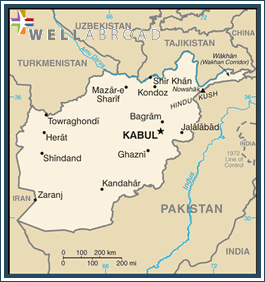|
MOST RECENT ALERTS
There's no recent alert.
|

|
|||||||||||||||
| COUNTRY OVERVIEW | ||||||||||||||||
|---|---|---|---|---|---|---|---|---|---|---|---|---|---|---|---|---|
|
| COUNTRY GENERAL INFORMATION | |||||||
|---|---|---|---|---|---|---|---|
| Language: |
Afghan Persian or Dari (official) 50%, Pashtu (official) 35%, Turkic languages (primarily Uzbek and Turkmen) 11%, 30 minor languages (primarily Balochi and Pashai) 4%, much bilingualism |
||||||
| Currency: | afghani (AFA) | ||||||
| Predominant Religions: |
Sunni Muslim 80%, Shi'a Muslim 19%, other 1% |
||||||
| National Holidays: | Independence Day, 19 August (1919) | ||||||
| Economic Status: |
Afghanistan's economy is recovering from decades of conflict. The economy has improved significantly since the fall of the Taliban regime in 2001, largely because of the infusion of international assistance, the recovery of the agricultural sector, and growth of the service sector. |
||||||
| Security: |
Afghan National Army (includes Afghan Air Force) |
||||||
| US Presence: |
The U.S. Embassy in Kabul |
||||||
| Document Requirements: |
A passport and valid visa are required to enter and exit Afghanistan. Afghan entry visas are not available at Kabul International Airport. American citizens who arrive without a visa are subject to confiscation of their passport and face heavy fines and difficulties in retrieving their passport and obtaining a visa, as well as possible deportation from the country. Americans arriving in the country via military air usually have considerable difficulties if they choose to depart Afghanistan on commercial air, because their passports are not stamped to show that they entered the country legally. Those coming on military air should move quickly after arrival to legalize their status if there is any chance they will depart the country on anything other than military air. Visit the Embassy of Afghanistan web site at http://www.embassyofafghanistan.org for the most current visa information. The Consular office of the Embassy of Afghanistan is located at 2233 Wisconsin Avenue NW, Suite 216, Washington, DC 20007, phone number 202-298-9125. |
||||||
| Major Airports: |
Airports: 46; Airports w/paved runways: 11 |
||||||
| Servicing Airlines: |
|
||||||
| Risks and Precautions: |
The United States Dept. of State issued a TRAVEL WARNING for Afghanistan, which was last updated on 8 March 2011. This information is also available online at: http://travel.state.gov/travel/cis_pa_tw/tw/tw_5369.html. The Department of State warns US citizens against travel to Afghanistan. The security threat to all US citizens in Afghanistan remains critical. This supersedes the Travel Warning for Afghanistan issued August 13, 2010, to remind US citizens of ongoing security risks, including kidnapping and insurgent attacks. Kabul is also considered at high risk for militant attacks, including rocket attacks, vehicle borne IEDs, and suicide bombings. Five United Nations (UN) workers were killed during an attack on a UN guesthouse in Kabul in October 2009. More than 20 attacks were reported in Kabul over the past year, although many additional attacks were thwarted by Afghan and coalition forces. Recent incidents include the bombing of a Kabul supermarket popular with Westerners and an attack on the Kabul City Center complex, which includes a hotel frequented by foreign visitors. Insurgents have also targeted the offices, convoys, and individual implementing partners of the U.S. Agency for International Development. |
||||||
| Mortality Statistics: |
Infant MR total: 151.95 deaths/ 1,000 live births |
||||||
| Immunization Indicators: |
Required: None |
||||||
| Infectious Disease Concerns: |
degree of risk: high
food or waterborne diseases: bacterial and protozoal diarrhea, hepatitis A, and typhoid fever
vectorborne disease: malaria
animal contact disease: rabies
|
||||||
| Overall Quality of Medical Services: |
Well-equipped medical facilities are few and far between throughout Afghanistan. European and American medicines are available in limited quantities and may be expensive or difficult to locate. There is a shortage of basic medical supplies. Basic medicines manufactured in Iran, Pakistan, and India are available, but their reliability can be questionable. Several western-style private clinics have opened in Kabul: the DK-German Medical Diagnostic Center (www.medical-kabul.com), Acomet Family Hospital (www.afghancomet.com), and CURE International Hospital (ph. 079-883-830) offer a variety of basic and routine-type care; Americans seeking treatment should request American or Western health practitioners. Afghan public hospitals should be avoided. Individuals without government licenses or even medical degrees often operate private clinics; there is no public agency that monitors their operations. Travelers will not be able to find Western-trained medical personnel in most parts of the country outside of Kabul, although there are some international aid groups temporarily providing basic medical assistance in various cities and villages. For any medical treatment, payment is required in advance. Commercial medical evacuation capability from Afghanistan is limited and could take days to arrange. Even medevac companies that claim to service the world may not agree to come to Afghanistan. Those with medevac insurance should confirm with the insurance provider that it will be able to provide medevac assistance to this country. |
||||||
| Providers in Network: |
|
||||||
| Recent Medical Threats/ Concerns/Warnings: |
There have been outbreaks of Avian Influenza in poultry in Afghanistan, to include the areas of Nangahar, Laghman, and Wardak provinces, and in the city of Kabul, however, there have been no reported cases of the H5N1 virus in humans. Updates on the Avian Influenza situation in Afghanistan are published on the Embassy’s web site at http://kabul.usembassy.gov/information_for_travelers.html. For additional information on Avian Influenza, please refer to the Department of State's Avian Influenza Fact Sheet available at http://travel.state.gov/travel/tips/health/health_1181.html Tuberculosis is an increasingly serious health concern in Afghanistan. For further information, please consult the CDC's Travel Notice on TB. http://wwwn.cdc.gov/travel/yellowBookCh4-TB.aspx |
||||||
| Communications Info: |
Country Calling Code: +93 |
||||||






